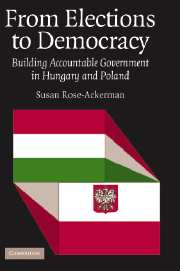Book contents
- Frontmatter
- Contents
- List of Tables
- Preface
- 1 Policy-Making Accountability and Democratic Consolidation
- 2 Alternative Routes to Policy-Making Accountability
- 3 Legacy of the Past
- 4 External Accountability and the European Union
- 5 Oversight
- 6 Decentralized Political Accountability
- 7 Public Participation in Policy Making: Government Procedures
- 8 Civil Society Groups: Overview
- 9 Environmental Advocacy Organizations in Hungary
- 10 Student and Youth Organizations in Poland
- 11 Democratic Consolidation and Policy-Making Accountability
- Appendix 1
- Appendix 2
- References
- Index
7 - Public Participation in Policy Making: Government Procedures
Published online by Cambridge University Press: 23 July 2009
- Frontmatter
- Contents
- List of Tables
- Preface
- 1 Policy-Making Accountability and Democratic Consolidation
- 2 Alternative Routes to Policy-Making Accountability
- 3 Legacy of the Past
- 4 External Accountability and the European Union
- 5 Oversight
- 6 Decentralized Political Accountability
- 7 Public Participation in Policy Making: Government Procedures
- 8 Civil Society Groups: Overview
- 9 Environmental Advocacy Organizations in Hungary
- 10 Student and Youth Organizations in Poland
- 11 Democratic Consolidation and Policy-Making Accountability
- Appendix 1
- Appendix 2
- References
- Index
Summary
The institutions of accountability discussed so far have weaknesses both in principle and in practice. Even those that promote performance accountability are of little help in ensuring the accountability of government policy making. Thus, we need to consider a final group of mechanisms that call on citizens and organized groups to participate in central-government policy making. The aim is not impartial external control but an active effort to incorporate the views of the public and of organized groups into the policy-making process.
Some political leaders in Central Europe have recognized the value of such participation, but their understanding of the possibilities has often been limited to consensual processes involving labor, business, and the government. These politicians have indeed identified an important democratic value, but they have an overly narrow conception of the options. To take one example, consider the following quotation from Péter Medgyessy from 1988 at the beginning of the transition period when he was Deputy Prime Minister of Hungary; he was Prime Minister between May 2002 and mid-August 2004:
What we [the government] should do is to make use of interest reconciliation, to base our decision-making on the consideration of the viewpoints of all those concerned. … [I]t is in the public interest that the country have not only responsible government, but [also] one which is in a position to take action and is able to act in difficult situations. … Today the government can achieve this position, through involving people in the preparation of decisions, sharing its information and concerns, and discussing its envisaged measures with them, making use of their comments. […]
- Type
- Chapter
- Information
- From Elections to DemocracyBuilding Accountable Government in Hungary and Poland, pp. 126 - 162Publisher: Cambridge University PressPrint publication year: 2005



